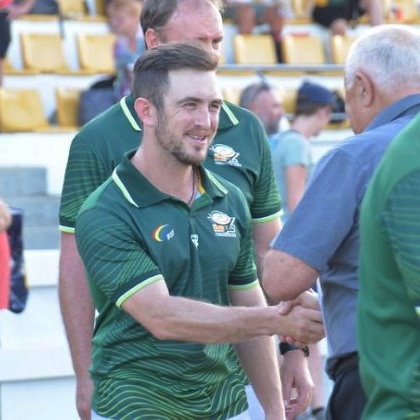click to dowload our latest edition
CLICK HERE TO SUBSCRIBE TO OUR NEWSLETTER


Published
5 years agoon
By
adminLUKE ALFRED
In the midst of passing the ball to his wing, Ackerman got caught by an Irish defender’s trailing elbow. Whether it was by accident or design, he isn’t quite sure.
All he does know is that Touch World Cups come around only every four years (the next one is in 2023) and suddenly, he was out of this one. Something he had trained for – and saved for, South African participants at such events are self-funded – so doggedly for years was now out of reach. “When I sat in hospital in Malaysia,” he says wryly. “It was the most disappointing moment of my life.”
Ackerman wasn’t down in the dumps for long. Fractured schnozz or not, he had a leadership role to play with the 145-strong South African contingent, and soon he was up and about, urging his teammates along.
The mixed open team of which he was part came only 12th in the competition, but without trumpeting his claims, he suspects that they would have done better if he’d been on the field and not shouting from the side-lines.
It all started for Ackerman in his final years at Crawford College in Sandton just more than ten years ago. After a couple of painful years deluding himself that he could make the grade as either a scrumhalf or a utility back, he slowly realised that he lacked the size and brawn for the 15-man game.
At much the same time, his path crossed serendipitously with that of touch coach Thabo Motsumi. “Given my size,” says Ackerman. “Touch became the light at the end of the tunnel.”
As the years progressed, so Ackerman became more and more, well, touched by the game. Motsumi was nominally his first coach but, over time, he soon became a mentor, father-figure, friend, and sounding-board.
One of the factors contributing to Ackerman’s disappointment in Malaysia was that it would have been an opportunity to play alongside Motsumi on the big stage. Alas, it was not to be. “He’s taught me – excuse the cliché – to be a real man,” says Ackerman. “He’s a pastor at his church. He loves the game. When we need someone to turn to, we invariably turn to him.”
Above that broken nose of his, Ackerman wears several hats. He’s a player, a touch coach, and an administrator to boot. The sport is still in its relative infancy in South Africa, and, while growing, it faces an uphill battle for funding and relevance, given that it is dwarfed by both Sevens and the 15-man game. “We struggle with the conception that it’s a girl’s sport,” says Ackerman, noting that touch breeds a dynamism and an attacking flair often absent from the 15-man game.
“The fastest growing region is Gauteng,” he says, “and it’s also growing in places like the Western Cape, KwaZulu-Natal, Buffalo City, and on the Wild Coast. In Gauteng, we have a solid working relationship with St Stithians College, which allows us to use its fields.”
Ackerman was in this crowd at Saints this past weekend, watching the hosts compete with King Edward VII until half-time before the visitors pulled menacingly away. “It made me aware that if you aren’t a perfect physical specimen nowadays, you don’t really have a future in the 15-man sport,” he says a touch ruefully, “which is one of the reasons I really like touch. It’s inclusive and we have mixed teams, and it’s really open to everybody regardless.”
Indeed, Ackerman is quick to point out the synergies between touch and other forms of rugby. Because, say, there is no kicking in touch, it encourages creativity and intelligent manipulation of the ball and space. And, he points out, two or three members of the respective first fifteens on show at Saints on Saturday were clearly influenced by playing touch.
Still, it’s a grind. The meneers (men) of the local 15-man game are disinclined to take seriously a sport that is played in part by women, and which fails to prioritise physical contact. For all his investment, Ackerman knows that he’s embarking on a hard sell to get touch to be taken with the seriousness he has always given to it.
Iranians accept Israel on the judo mat
In a move that signals the thawing of traditionally frosty relations between Iran and Israel on the judo mat, the Iranian Olympic Committee has agreed to respect the Olympic charter’s principle of non-discrimination” reports the Times of Israel. While the Iranian statement did not specifically mention Israel by name, the softening stance has been widely interpreted to refer to Israeli judokas.
Iranians have in the past contrived to avoid Israelis in international competition, feigning injury, and sometimes refusing to shake hands on the podium. The Times of Israel speculates that the Iranian stance has, in part, been brought about by the threat of expulsion from the International Judo Federation in which Israel is playing an increasingly influential part.
